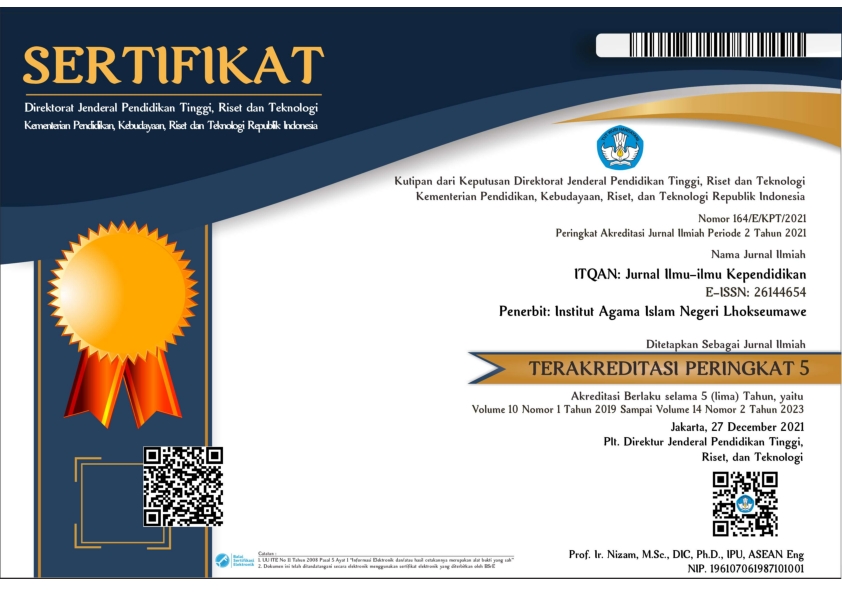Integration of Science Based on Philosophy Review (Study Aspects of Ontology, Epistemology, and Axiology)
Main Article Content
Nursri Hayati
Irwan Shaleh Dalimunthe
This study aims to determine how the integration of science based on a review of philosophy through the study of aspects of ontology, epistemology, and Axiology. This research utilizes library research methods along with data analysis techniques like as content analysis/content analysis. The findings of this study show that the integration of Science from the point of view of Ontology shows that the study of Science concerns all that exists in the universe, both abstract and concrete, and the integration of Science from the viewpoint of Epistemology shows that religious science is obtained through the process of study and interpretation through the verses of qauliyah, whilst general science is obtained through observation and experimentation through the verses of kauniyah, both of which are equally sourced from Allah Subhaanahu Wata’ala. Epistemology demonstrates that Allah SWT provides knowledge through his guidance in the Qur'an, Hadith, and the universe. The axiology aspect illustrates that knowledge integration is intended to form a perfect human (insān kāmil), or a complete human being with breadth of insight and greatness of character; knowledge integration is also an effort of raḥmatan lil 'ālamīn.
Akbarizan. (2014). Integrasi Ilmu. Yogyakarta: UIN Suska.
Caruso, D. R., & Salovey, P. (2004). The Emotionally Intelligent Manager: How to Develop and Use the Four Key Emotional Skills of Leadership. John Wiley & Sons.
Charles. (2011). Integrasi Ilmu dengan Agama untuk Mengangkat Harga Diri Pelajar Muslim. Annual International Conference on Islamic Studies, 2168–2185.
Efrinaldi, E., Andiko, T., & Taufiqurrahman, T. (2020). The Paradigm of Science Integration in Islamic University: The historicity and Development Pattern of Islamic Studies in Indonesia. Madania: Jurnal Kajian Keislaman, 24(1), 97–108. https://doi.org/http://dx.doi.org/10.29300/madania.v24i1.3326
Ekawati, D. (2013). Reorientasi Ontologi, Epistemologi, dan Aksiologi dalam Perkembangan Sains. Jurnal Tarbawiyah, 10(2), 75–84.
Endress, G. (2014). Averroes (Ibn Rushd). In Medieval Philosophy of Religion (pp. 121–135). Routledge.
Fadli, M. R. (2021). Memahami Desain Metode Penelitian Kualitatif. Humanika, Kajian Ilmiah Mata Kuliah Umum, 21(1), 33–54.
Fatha Pringgar, R., & Sujatmiko, B. (2020). Penelitian Kepustakaan (Library Research) Modul Pembelajaran Berbasis Augmented Reality pada Pembelajaran Siswa. Jurnal IT-EDU, 05(01), 317–329.
Halstead, M. (2004). An Islamic Concept of Education. Comparative Education, 40(4), 517–529. https://doi.org/https://doi.org/10.1080/0305006042000284510
Hassan, R. (1985). The Meaning and Role of Intuition in Iqbal’s Philosophy’. Iqbal Review, 26(1), 67–99.
Hayati, N. (2021). Konsep Manusia Berdasarkan Tinjauan Filsafat (Telaah Aspek Ontologi, Epistemologi dan Aksiologi Manusia). Forum Paedagogik, 12(1), [23 p.].
Husaini, & Anisaturrahmi. (2019). Implementasi Integrasi Kurikulum pada TK Almanar Kabupaten Bener Meriah. Jurnal Pendidikan, 8(1), 56–72.
Istikomah, I. (2017). Integrasi Ilmu Sebuah Konsep Pendidikan Islam Ideal. Jurnal Pemikiran Keislaman, 28(2), 408–433. https://doi.org/10.33367/tribakti.v28i2.490
Koyan, I. W. (2014). Metodologi Penelitian Kualitatif. UNDIKSHA Singaraja.
Mansour, N. (2010). Science Teachers’ Interpretations of Islamic Culture Related to Science Education Versus the Islamic Epistemology and Ontology of Science. Cultural Studies of Science Education, 5(1), 127–140. https://doi.org/https://doi.org/10.1007/s11422-009-9214-5
Mirakhor, A. (1987). The Muslim Scholars and the History. American Journal of Islamic Social Sciences 4: 2, 4(2), 245.
Nata, A., & dkk. (2005). Integrasi Ilmu Agama dan Ilmu Umum. RajaGrafindo Persada.
Norenzayan, A., Shariff, A. F., Gervais, W. M., Willard, A. K., McNamara, R. A., Slingerland, E., & Henrich, J. (2016). The Cultural Evolution of Prosocial Religions. Behavioral and Brain Sciences, 39. https://doi.org/https://doi.org/10.1017/S0140525X14001356
Prasetyo, Y. (2018). ‘Irfâniy as Epistemology Method Sufsm Based on Conscience. Jurnal TSAQOFAH, 14(2), 207–222.
Raelin, J. A. (2007). Toward an Epistemology of Practice. Academy of Management Learning & Education, 6(4), 495–519. https://doi.org/https://doi.org/10.5465/amle.2007.27694950
Ritonga, A. R. (2016). Memahami Islam Secara Kaffah: Integrasi Ilmu Keagamaan dengan Ilmu-Ilmu Umum. Islam Realitas: Journal of Islamic & Social Studies, 2(2), 118. https://doi.org/10.30983/islam_realitas.v2i2.183
Salabi, A. S. (2021). Konstruksi Keilmuan Islam (Studi Pemikiran Ibnu Rusyd tentang Ontologi dan Epistimologi). ITQAN: Jurnal Ilmu-Ilmu Kependidikan, 12(1), 47–66. https://doi.org/https://doi.org/10.47766/itqan.v12i1.188
Slamet. (2019). Konsep Integrasi Ilmu dan Agama. As-Salam Jurnal Ilmiah Ilmu-Ilmu Keislaman, II(03), 231–245.
Ulwiyah, N. (2015). Landasan Psikologi dan Aktualisasinya dalam Pendidikan Islam. Religi: Jurnal Studi Islam, 6(April).



